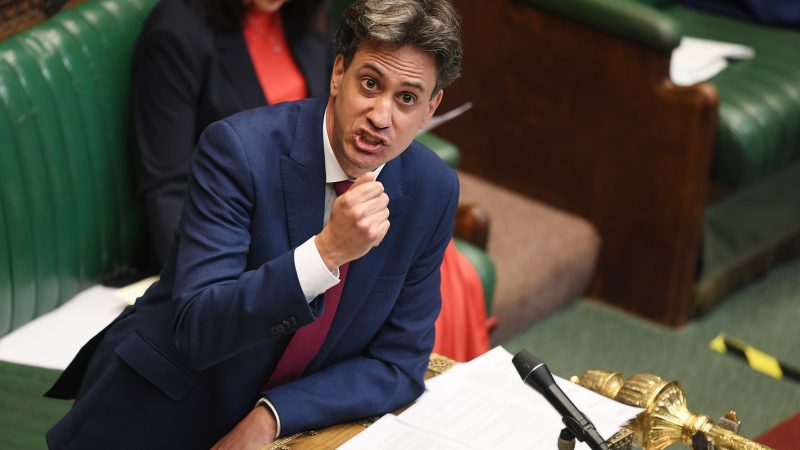
Ed Miliband has called on the government to cancel its “terrible decision on Universal Credit” and abandon plans to press ahead with a £20-per-week reduction in the benefit in light of rising energy prices.
Addressing parliament this afternoon, the Shadow Business Secretary welcomed the decision to retain the price cap but warned MPs that half a million more families will be pushed into poverty under an already planned 12% rise next month.
“As a minimum, he should be looking at making the operation of £140 warm homes discount automatic and possibly extending it, but even that will not be enough,” Miliband told Kwasi Kwarteng.
“Families are facing a triple whammy. Rising energy prices, National Insurance rises and at the end of this month the £1,000 cut in Universal Credit. Mr Speaker, these energy price rises turn the indefensible decision on Universal Credit into an unconscionable one.
“If he really wants to put consumers first, if he really wants to help working people, if he really wants to tackle fuel poverty – isn’t it time, even at this late stage, to cancel this terrible decision on Universal Credit.”
Kwarteng made a statement to parliament on the energy crisis this afternoon, telling MPs that the government would not “bail out failed companies”, following reports that ministers are considering financial packages.
The Business, Energy and Industrial Strategy Secretary told parliament that “we do not expect supply emergencies this winter” and said the UK has an “excellent relationship with Norway”, which supplies 30% of the UK’s gas.
Miliband said he agreed that the government should not be “alarmist” over supply security but warned that the Secretary of State had been “much too complacent on the price and economic impact of the current situation”.
He also asked whether taxpayer funds would be needed to provide support for the large number of people left without an energy provider as companies go bust.
Consumers are currently automatically switched to a new provider when a firm goes out of business on a tariff agreed by Ofgem, but this can be more expensive than the deal they had with their former company.
The regulator announced on Monday that British Gas will take over the 350,000 domestic customers of People’s Energy after it went bust earlier this month. Four firms have already gone bust and there are fears that others could follow.
Wholesale prices for gas have increased 250% since the start of the year and there has been a 70% rise since August. The price cap, which protects 15 million customers from surges in prices, will increase from October 1st. Those on default tariffs paying by direct debit will see an increase of £139 from £1,138 to £1,277. Prepayment customers will see a rise of £153.
The Universal Credit uplift was introduced during the first wave of Covid, raising the standard rate for a single, over-25 claimant from £317.82 to £409.89 a month. Theresa Coffey confirmed in July that it would not be extended beyond the autumn.
Ministers have suggested that the withdrawal is part of a push to get people into work, despite the latest Department for Work and Pensions figures showing that almost 40% of people on the benefit are in employment.
Almost six million households will lose £20 per week as a result of the cut. The standard allowance for a single person over 25, excluding rent, will be £324.84 per month. It will be £257.33 per month for under-25s.
The Joseph Rowntree Foundation has estimated that this move alone will send half a million people, including 200,000 children, into poverty. A recently leaked departmental memo admitted that “homelessness and poverty are likely to rise, and food banks usage will soar”.




More from LabourList
Economic stability for an uncertain world: Spring Statement 2026
‘Biggest investment programme in our history’: Welsh Labour commit to NHS revamp if successful in Senedd elections
James Frith and Sharon Hodgson promoted as government ministers